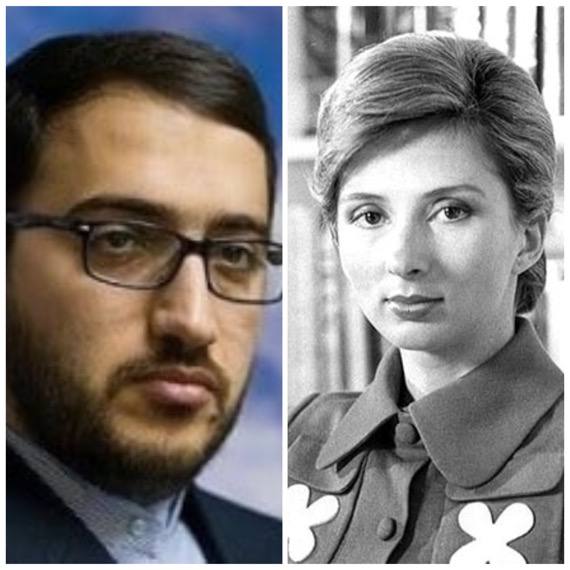What Happened to the Institute for the Intellectual Development of Children and Young Adults
From Leili Amir Arjmand to Hamed Alamaty, what has happened to the Institute for the Intellectual Development of Children and Young Adults? Non-specialized, nepotistic, and connection-based appointments have peaked in Ebrahim Raisi’s government, but now a completely political appointment, unrelated to the goals of an institution meant to nurture the creativity of children and adolescents, has raised the voices of those in this field.
The newly appointed managing director of the Institute for the Intellectual Development of Children and Young Adults was previously the Secretary-General of the Union of Islamic Student Associations and the Director-General of Parliamentary Affairs at the Islamic Propagation Organization, with no background in literary and artistic creation or understanding of its world. As Ali Asghar Seyd Abadi, a journalist and writer in the field of children and adolescents, wrote, this appointment is not only an insult to all creators of cultural and artistic works for children and adolescents but also a severe blow to the independence of the Institute, reducing its function to official education and propaganda.
The Institute in the First 13 Years
The first and last managing director of the Institute before the revolution was Leili Amir Arjmand, a friend of Farah Pahlavi, who held the position for 13 years. These 13 years were the peak of the Institute’s development and productivity. Libraries were established in various cities, and many children and adolescents became members of the Institute’s centers. Many emerging artists began their cultural and artistic activities during this period with the Institute’s support, enabling them to produce valuable works, some of which received international awards. Nasser Taghvai, Abbas Kiarostami, Noureddin Zarrinkelk, Bahram Beyzai, Amir Naderi, and Farshid Mesghali are among those whose collaboration with the Institute was shining both for themselves and the Institute.
The Leftists in the Institute
Although the Institute for the Intellectual Development of Children and Young Adults was founded with the support of Farah Pahlavi and continued to receive this support throughout its operation, and it was assumed to be one of the institutions close to the political system of the time, it was not dominated by a closed political perspective, and there was no strictness for the presence and activity of figures with opposing political backgrounds critical of the Pahlavi regime. For example, a figure like Firouz Shirvanlou, a member of Parviz Nikkhah’s group and one of the accused in the assassination attempt on Mohammad Reza Pahlavi, who was also detained for a while, was responsible for the Institute’s publications.
It is said that he played a significant role in the development of the Institute’s activities. The trust in this cultural figure with a leftist background was such that after leaving the Institute, he became the artistic advisor to Farah’s office. Shirvanlou was a member of the Confederation of Iranian Students with leftist inclinations. It is said that hiring elites at the Institute was Shirvanlou’s work. He invited people like M. Azad, Siros Tahbaz, Nader Ebrahimi, Siavash Kasraei, Manouchehr Nistani, and Samad Behrangi to collaborate to advance children’s literature. Samad Behrangi’s book ‘The Little Black Fish,’ which was a symbolic protest text against the political system, was published by the Institute’s press with Shirvanlou’s support.
The Extinguishing of the Institute’s Light
This dynamism and diversity governing the Institute’s productions faded after the revolution with the loss of its independence and its transformation into a subsidiary of the Ministry of Education. The first managing director after the revolution was Seyed Kamal Kharazi, the Foreign Minister during the reform era. After him, Alireza Zarrin, Mohsen Chini Foroushan, Seyed Sadegh Rezaei, Alireza Hajian Zadeh, Fazel Nazari, Mehdi Ali Akbarzadeh, and now recently Hamed Alamaty have been appointed to this position.
Ali Asghar Seyd Abadi recently wrote in an Instagram post about this appointment, ‘The day I heard Fazel Nazari became the managing director of the Institute for the Intellectual Development of Children and Young Adults, I thought it was a wrong choice. I wrote a short note explaining my reasons. But the new managing director of the Institute is indeed a strange choice that undermines the Institute’s existential philosophy with his selection.’
Fazel Nazari was at least a poet and had a hand in literature, even if we didn’t like his orientation. But we thought that within that orientation, outside of which no one was supposed to be chosen, there were others who had a hand in literature and arts specific to children and were preferred over him. Now, however, as I review the record of this new director, there’s not a single thin thread connecting him to the Institute’s function. He has no relation to the Institute and has sat on this chair based on a misunderstanding of the Institute for the Intellectual Development of Children and Young Adults.
This misunderstanding, of course, has a history. This crooked foundation was laid when the Institute lost its independence and became a company within the Ministry of Education. The Institute, which was fundamentally about nurturing thought, imagination, and creativity, and had defined its mission as building libraries and producing cultural and artistic products, became an appendage of the Ministry of Education and was confined to the narrow view of formal education.

